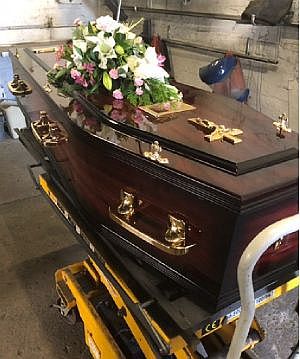While conducting research on health care and end-of-life options for older adults in Mexico, and volunteering at a Guadalajara palliative care hospital and hospice, I have witnessed both expected and unexpected deaths of Americans, Canadians, other foreigners, and Mexicans.
In the case of Mexicans, the procedure following death is almost seamless, with rare exception. The question is, how will you prepare for such a situation if you are not Mexican? Here is some of what I've learned in expat havens from Alamos to Ajijic, Mazatlan to Merida, and Tijuana to Oaxaca:
If you wish to save your family, other loved ones, and your neighbors considerable grief and time, it is important to understand what is involved when a foreigner dies in Mexico, and, to have a plan in place. This goes for 18-year olds, 40-year olds, and especially for all persons over age 60.
Even though the subject is one many of us prefer to avoid, family and friends back home, as well as your local neighbors, will be grateful if you plan ahead. Planning ahead might even give you some peace of mind!
WHAT TO BE AWARE OF
 |
Mexico is a country with predominantly Catholic traditions. These traditions influence choices. If you are Catholic, the system may seem familiar, such as burial over cremation. If you had chosen to live in Buddhist or Hindu Asia, cremation would be a relatively easy matter involving fewer steps as cremation is common practice. Or, you could have opted for a Tibetan sky burial.
The Mexican culture, language, and way of thinking are unique. Most of all, procedures may be unfamiliar and complex.
PREPARING AHEAD FOR YOUR DEMISE & DISPOSITION OF REMAINS IN MEXICO
The key Mexican legal document you need to acquire for best outcomes is a Declaración Jurada (more or less the equivalent of a living will) stating burial or cremation wishes. This document must be created before your demise. The 'declaración jurada' will almost always insure your plan is followed. It is usually prepared by a notario (notary). Current costs are approximately 1000 pesos in Jalisco state, for example.
 |
Some funeral homes offer notarized Letters of Intention for cremation or burial. This, in addition to your declaración jurada, is a somewhat reliable back-up. These funeral homes will give you a card to carry on your person at all times; the card contains your name and other details plus their contact information. But remember, not all funeral homes offer this service, so be sure to ask.
Your Advance Health Care Directive or Five Wishes from home is not valid in Mexico even if notarized, apostilled and translated into Spanish... unless you get lucky.
You are best off incorporating preferences from your Advance Directive or Five Wishes in your Mexican legal document. Most legal documents for foreigners, unless you live in a rural area, are written in Spanish on one half of the page, and English on the other. Again, this is the most important document you can obtain relating to your end-of-life wishes. Note: there is no guarantee your healthcare requests will be honored by doctors, hospitals, and ambulance services, just as in your home country. Your cremation request will be honored if it is in writing and your papers are presented.
Burial in Mexico
 |
The population from Chapala to Jocotopec (north Lake Chapala) just south of Guadalajara, for example, is around 100,000, including some 20,000 full-time expats. There are approximately 80+ deaths per year among the expat community according to Chapala's Registro Civil, Civil Registry office. Ajijic Cemetery along Lake Chapala serves a population of 10,000. It is full unless a family will sell you a plot there.
Cremation in Mexico
When death occurs in Mexico, local practices will govern how quickly a cremation can take place. In the state of Jalisco burial or cremation must be within 48 hours, or the body must be embalmed. There is one exception – a body can lie up to 30 days in refrigeration (if refrigeration is available and with permission) awaiting family members from out of country to view the remains. Then cremation or interment will take place.
In Mexico your legal next-of-kin may request cremation or interment if you do not have a notarized living will with end-of-life wishes. It is unwise, however, to depend on good luck or miracles in this situation – again, best to have a Mexican living will.
Some churches in Mexico offer space for cremated remains in an urn or box in a mini-mausoleum setting. Here again, you are usually paying for a specified number of years.
Note: According to a U.S. Consulate website, "if the deceased is to be transported between states in Mexico for cremation, the body must be embalmed. If the body is to be transported over 100 km a special transit permit is also required."
Crematories
By law, a body is to be identified ahead of time. In Guadalajara, for example, no toe tags are used. Photos are taken of faces before the procedure. The name of the person is also written on a ticket. That ticket, serving as I.D., is inserted into a slot space outside the crematory machine.
Shipment of Remains Outside of Mexico
 |
If your body has been cremated, a cremation certificate from the funeral home, an affidavit from the funeral director, and an original copy of the death certificate must be delivered to the nearest Embassy or Consulate. (See U.S. Government 7 FAM 258 Documents To Accompany Remains; these regulations were last updated January 18, 2013). If you die in a small city or rural area and cremation is your preference, understand the expense, effort, and permissions needed to fulfill this requirement.
According to the U.S. government, a consular officer will prepare a mortuary certificate to ensure "orderly shipment of remains and facilitate U.S. Customs clearance." The certificate will be delivered to you in English and it will contain the essential information including cause of death.
As for shipment of remains in a casket, a U.S. consular officer will work to ensure that the Mexican funeral director and American funeral director are in communication to guarantee preparation of remains complies with local, U.S. Department of State, and federal requirements. All corpses going to the U.S. must be embalmed.
Also note: DHL, Federal Express, and embassy diplomatic pouches cannot be used to ship cremated remains out of the country. There is no customs fee to ship remains to the U.S. Note: Shipment of remains outside of Mexico involves not only high cost, but red tape. Consider buying repatriation of remains insurance.
Few people know where they will die or when. If you spend time in Mexico, or any Latin American country with deeply Catholic traditions, where family ties and support reign (i.e. you will be rescued and your loved ones will know what to do), as well as strict codes and preferences that may not be yours, please choose to prepare yourself. Being prepared will create peace of mind for yourself, your loved ones, and your neighbors.
For more information, sources and other details to consider for smoother disposition of remains in Mexico, please read the full article on wellnessshepherd.com.
Wendy Jane Carrel, MA, is a Spanish-speaking senior care specialist from California. Over a period of several years she has traveled state to state in Mexico researching senior care options. She volunteers at the only 24/7 palliative care hospital/hospice in Jalisco which also has a community outreach service. She has investigated, studied, and negotiated health systems, senior care options, end-of-life care and planning, and, disposition of remains in Mexico. For more information, visit WellnessShepherd.com, or contact her at wellnessshepherd(at)aol.com.


